Beyond the Walls: Perfect tiles for every outdoor space
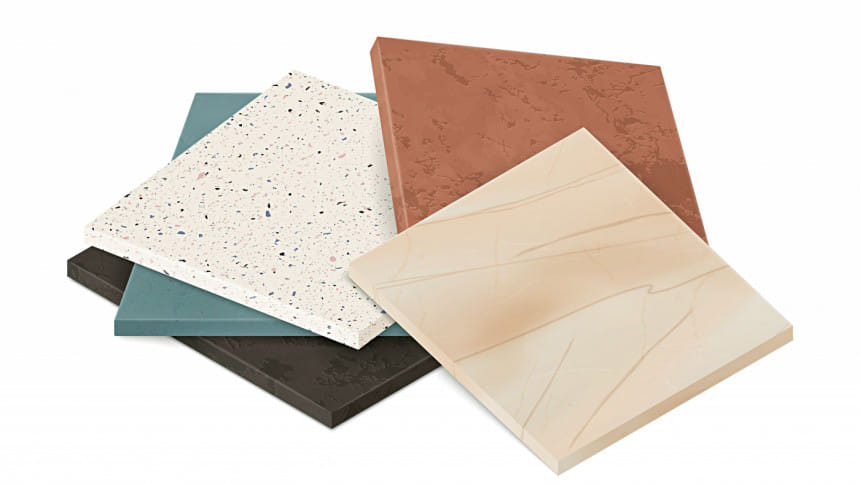
Outdoor spaces are an extension of your living environment, which serve as places for relaxation, entertainment, and even gardening. One of the best ways to enhance these outdoor spaces is by choosing the right kind of tiles. Outdoor tiles not only add beauty but also provide durability, functionality, and easy maintenance. Whether you're planning to tile your roof, terrace, facade, or the pavements of your residential area, the right tiles can transform your outdoor area into a stunning, functional space.
"Tiles used for outdoor spaces must have anti-skid properties, high water resistance, lightweight structure, yet high load-bearing capacity," mentioned Md. Shahidul Islam, Manager (Laboratory & Product Development) at Khadim Ceramics.
Why use tiles for outdoor spaces
Durability & weather resistance
Outdoor tiles are specifically manufactured to withstand the harshest environmental conditions. Unlike indoor tiles, they can endure high foot traffic, abrasion and do not easily get affected by weather elements like rain, heat, UV rays, and humidity. This weather resistance ensures that the tiles will not crack, fade, or warp, even after prolonged exposure to outdoor elements. "Since our weather is moist, damp is common and tiles are perfect solutions for preventing tarnished look or discoloration in outdoor spaces in the long run," commented Fardina Faridi, Architect at Best Holdings Ltd.
The materials used for making outdoor tiles, such as porcelain, ceramic, or natural stone, are highly resistant to wear and tear, ensuring that they last for many years. Whether it's the constant exposure to sunlight on a rooftop, the moisture on a terrace, or the occasional heavy foot traffic on pavements, outdoor tiles can endure the stress and continue to look as good as new.
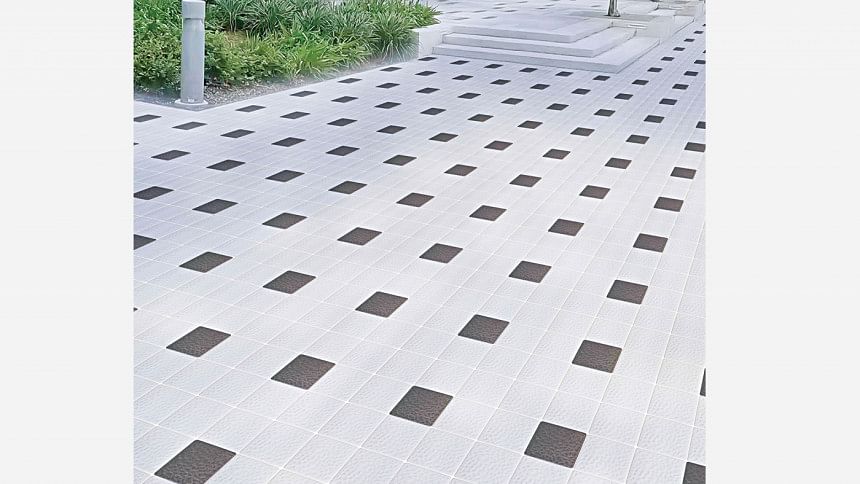
Minimal maintenance, maximum worth
One of the most significant benefits of outdoor tiles is their ease of maintenance. The non-porous tiles (especially porcelain or glazed ceramic) resist water or dirt absorption, which means they are easier to clean and maintain compared to other surfaces like wood or concrete. Spills, stains, dirt, and grime can be quickly wiped away with minimal effort. Regular cleaning with water and mild detergent keeps the tiles looking fresh and new, which is especially important for areas that are constantly exposed to dust or wet conditions.
Considering easy maintenance and reduced cost for upkeep in the long run, tiles offer the maximum worth. "Tiles costs have reduced significantly as local companies have increased competition. They are no longer a luxurious product, but almost a commodity now," mentioned Md. Mahmudur Rahman, Brand Manager of RAK Ceramics.
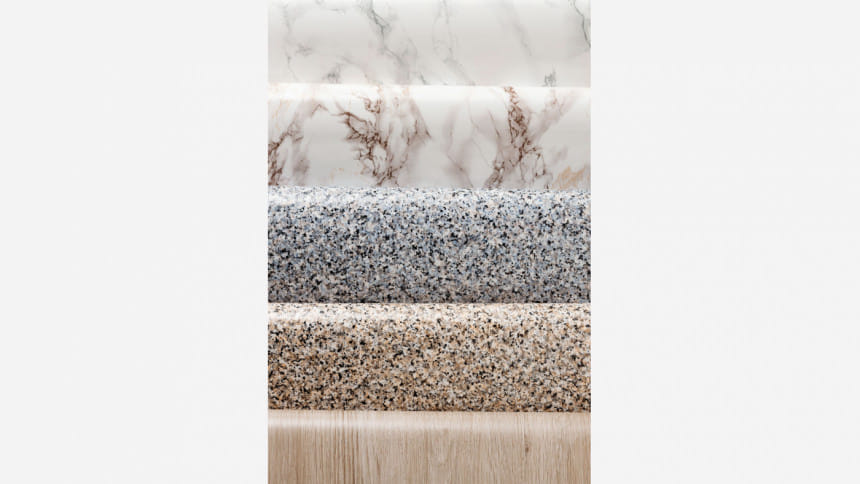
Enhanced aesthetics
Outdoor tiles come in various designs, colors, textures, and finishes, which means they can complement any architectural style. From sleek, modern designs to rustic or natural stone looks, outdoor tiles offer an almost unlimited range of possibilities for aesthetic customization. Whether you want your terrace to feel like a luxury resort or your facade to match the rest of your home's decor, tiles can provide the perfect solution. Additionally, with the wide variety of patterns available, such as herringbone, chevron, or subway tiles, you can create beautiful visual effects and dynamic surfaces that will enhance the charm of your outdoor spaces.
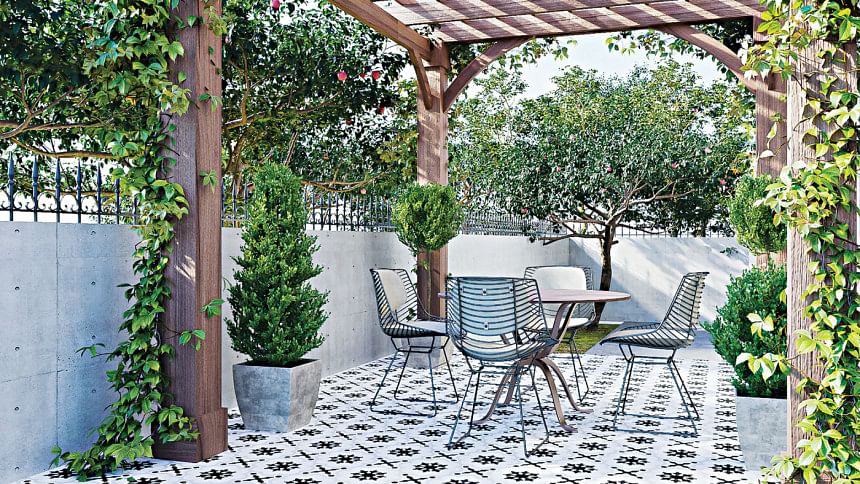
Choosing perfect tiles for different outdoor areas
Rooftop & terrace
Tiles for rooftops and terraces combine durability, functionality, and style to transform these spaces into inviting areas for relaxation or social gatherings. They come in various textures and colors, offering both slip resistance and design appeal, making them ideal for creating stylish yet safe lounging areas. "For terraces or rooftops, customers prefer outdoor tiles with unique designs resembling wood, stone, or other natural textures. Khadim Ceramics' Eternal Series offers a variety of such options," said Islam.
Beyond aesthetics, rooftop tiles also contribute to temperature regulation, reflecting heat and keeping the space cooler during warmer months. Fardina Faridi, Architect at Best Holdings Ltd. suggested, "Opt for thicker and less heat absorbing tiles for rooftops. Reflectable tiles, which are light colored, easily reflect light and absorb less heat. If more light is absorbed the roof is overheated and the floor immediately under the roof becomes hot." Tiles with 13mm thickness are recommended for rooftops by Rahman from RAK Ceramics.
Textured or matte-finish tiles provide better traction required for rooftop or terrace, preventing accidents caused by slippery surfaces. Matte tiles are preferred over polished tiles for rooftops since it will be installed outdoors. They go well with outdoor ambiance, especially if anyone has a rooftop garden or open terrace. Mohammed Ashraful Haque, General Manager, Akij Ceramics Limited points out, "Anti-slip, rough surfaced matte tiles with 12x12 inch, 30x30 cm or 30x60 cm of size are ideal for rooftops. Rooftop tiles provide an extra layer and reduce the heat transfer."
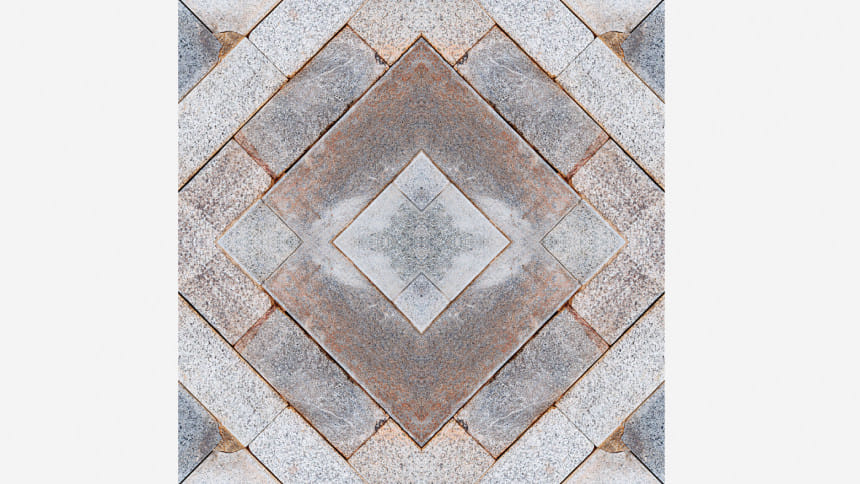
Facade
Choosing the right facade tiles which complement the architectural style and color scheme of the building enhances the overall appearance of your house. Tiles with low-porosity works great for the exterior since it barely requires maintenance. They are also highly-durable and resistant to fading or cracking. Matte finish tiles are also better at hiding dirt or stain compared to glossy tiles.
"Granite, porcelain or limestone tiles can be used for a building's facade. Ceramic bricks from Mirpur Ceramics also provide a unique theme and absorb less heat as well which keeps the building cool," said Architect Faridi.
Using tiles for facades is a practical choice due to the aesthetic appeal and resistance to moisture and weather changes. Materials like limestone, quartz, granite, and ceramic tiles are not only durable but also easier to maintain than traditional paint. Their resilience against seasonal effects ensures long-lasting beauty and convenience for exterior application.
Pavement & Parking
Tiles for parking areas and pavements are designed to withstand heavy loads, high abrasion and constant wear, offering durability and slip resistance. Ceramic tiles are an excellent choice for parking areas and pavements due to their durability, slip resistance, and ability to withstand heavy loads. Additionally, they are easy to clean and come in various textures and finishes, enhancing both safety and aesthetic appeal for outdoor spaces.
"For areas with high traffic or load-bearing needs, such as parking lots or pathways, choose heavy-duty tiles like Khadim Ceramics' Parking Tile 55. Pavers can also be an alternative for parking areas," said Islam from Khadim Ceramics.
While installing tiles may cost more in some cases, the upfront cost comes with long-term benefits. Regarding installation Islam from Khadim Ceramics said, "Outdoor tile installation requires pre-casting or surface preparation, which somewhat increases installation costs. For rooftops or terraces, if the surface is already prepared, only rough plastering is necessary before tile installation. Tile adhesive ensures long-term durability and safety in both scenarios."
Choosing the right tiles for outdoor spaces of your residence is essential to creating a durable, aesthetically pleasing, and safe environment. By selecting quality tiles tailored to your specific needs and preferences, you can transform your outdoor areas into beautiful and functional spaces that will last for years.

 For all latest news, follow The Daily Star's Google News channel.
For all latest news, follow The Daily Star's Google News channel. 



Comments